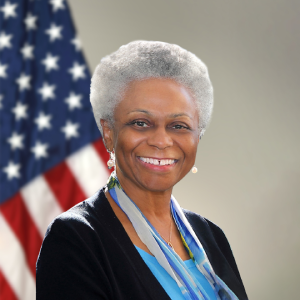
Marie A. Bernard, M.D., is the National Institutes of Health (NIH) Chief Officer for Scientific Workforce Diversity (COSWD). As the COSWD, she leads NIH thought regarding the science of scientific workforce diversity, assuring that the full range of talent is accessed to promote scientific creativity and innovation. Dr. Bernard co-led the development of the Fiscal Years 2023 – 2027 NIH-wide Strategic Plan for Diversity, Equity, Inclusion, and Accessibility (DEIA) and is working on its implementation. She is also a cochair of the Advisory Committee to the NIH Director Working Group on Diversity, the NIH Steering Committee Working Group on DEIA, and the NIH UNITE initiative to identify and address any structural racism that may exist within NIH and throughout the biomedical and behavioral workforce.
Prior to being selected as the COSWD in 2021, she was Deputy Director of the National Institute on Aging (NIA), where she led a broad range of activities, including cochairing two Department of Health and Human Services Healthy People 2020/2030 objectives – 1) Older Adults, and 2) Dementias, including Alzheimer’s disease. Until October 2008, she was the endowed professor and founding chair of the Donald W. Reynolds Department of Geriatric Medicine at the University of Oklahoma College of Medicine and Associate Chief of Staff for Geriatrics and Extended Care at the Oklahoma City Veterans Affairs Medical Center. She has held numerous national leadership roles and received accolades for her national leadership in geriatrics research, teaching, and clinical practice. She has lectured and published widely in her area of research, nutrition and function in older adults, with particular focus on underrepresented populations.
Dr. Bernard earned her A.B. from Bryn Mawr College, Bryn Mawr, Pennsylvania, and her M.D. from University of Pennsylvania, Philadelphia. She trained in internal medicine at Temple University Hospital, Philadelphia, where she served as chief resident. She received additional training through the Association of American Medical Colleges Health Services Research Institute, the Geriatric Education Center of Pennsylvania, and the Wharton School Executive Development Program.
